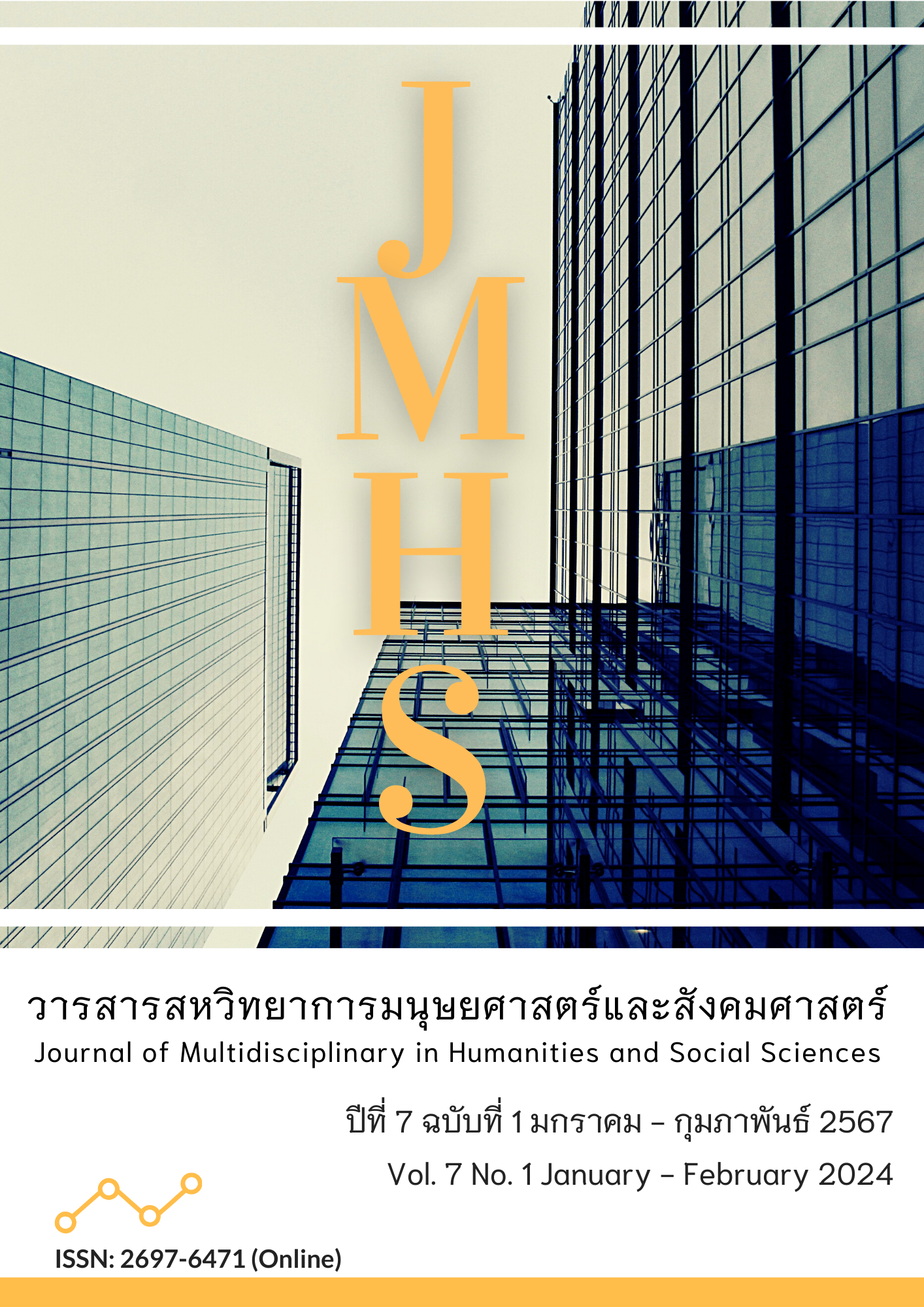Innovative Leadership with Change Management in Government Organization under VUCA Era
Main Article Content
Abstract
The ability to analyze trends and directions for effective organizational change management by leadership is important in leading the organization to achieve its goals. This study aimed to analyze innovative leadership and change management in government organizations during the VUCA era. mixed-methods research, including qualitative and quantitative studies from administrators, operating personnel, and the general public in the sub-district administrative organization, Chiang Rai Province. Data collection came from document synthesis and interviews with 40 key informants in the study of innovative leadership and change management in government organizations, including questionnaire surveys with 422 samples in the study of causal factors in innovative leadership and change management in government organizations under the VUCA era.
The study revealed that innovative leadership with change management in government organizations consisted of six elements: 1) having the vision for changes; 2) having the creative thinking for changes; 3) creating an innovative organizational atmosphere for changes; 4) teamwork-based participation for changes; 5) risk management for changes; and 6) creating the organization culture for changes to the 26 indicators. The causal factors of innovative leadership and change management in government organizations under the VUCA era are positive direct influences that are consistent with empirical data at statistical significance levels of 0.05. However, this knowledge will be useful in determining the direction of change management in government organizations effectively in the VUCA era.
Article Details

This work is licensed under a Creative Commons Attribution-NonCommercial-NoDerivatives 4.0 International License.
Views and opinions appearing in the Journal it is the responsibility of the author of the article, and does not constitute the view and responsibility of the editorial team.
References
โกวิทย์ นาเมืองรักษ์. (2553). การประเมินการจัดการภาครัฐแนวใหม่ของเทศบาล. กรุงเทพฯ: สถาบันบัณฑิตพัฒนาบริหารศาสตร์.
จิดาภา เร่งมีศรีสุข, ชนิดาภา กระแจะจันทร์, สมพงษ์ เกษานุช, นันทยา คงประพันธ์ และ นภัทร์ แก้วนาค. (2566). รูปแบบการสร้างเสริมระบบการบริหารจัดการเศรษฐกิจชุมชน แบบมีส่วนร่วมวิถีปกติใหม่ ของชุมชนลำไทร อ.วังน้อย จ.พระนครศรีอยุธยา. วารสารสหวิทยาการมนุษยศาสตร์และสังคมศาสตร์, 6(1), 58-70. https://so04.tci-thaijo.org/index.php/jmhs1_s/article/view/261189
ประเวช ชุ่มเกษรกูลกิจ และ ศจีมา ณ วิเชียร. (2561). พฤติกรรมสร้างนวัตกรรมในการทำงาน แนวคิดปัจจัยเชิงสาเหตุ ความท้าทาย. วารสารพฤติกรรมศาสตร์เพื่อการพัฒนา, 10(1), 25-41. สืบค้นจาก https://so02.tci-thaijo.org/index.php/JBSD/article/view/110682
พรชัย เจดามาน, ขจรศักดิ์ บัวระพันธ์, โชคชัย ยืนยง, ไพรฑูรย์ พิมดี, อัคพงศ์ สุขมาตย์ และ เจริญ สุขทรัพย์. (2566). ยุทธศาสตร์การบริหารจัดการศึกษาในพลวัตศตวรรษที่ 21 สู่การเป็นประชาคมอาเซียนอย่างยั่งยืนของกลุ่มประเทศในอนุภูมิภาคลุ่มแม่น้ำโขง. วารสารสหวิทยาการมนุษยศาสตร์และสังคมศาสตร์, 6(1), 68- 186. สืบค้นจาก https://so04.tci-thaijo.org/index.php/jmhs1_s/article/view/261779
พระมหาดวงเดน ตุนิน, พระปลัดสมชาย ดําเนิน, พระมหาดนัย ศรีจันทร์ และ พระวีระศักดิ์ สุวรรณวงศ์. (2561). การบูรณาการองค์ความรู้หลักการ และวิถีปฏิบัติตามแนวทางศาสนา เพื่อการพัฒนากระบวนการสร้างสันติภาพ. วารสารสันติศึกษาปริทรรศน์ มจร, 6(2), 474-489. สืบค้นจาก https://so03.tci-thaijo.org/index.php/journal-peace/article/view/108490
พัชราภรณ์ ดวงชื่น. (2561). ผู้นำองค์กรในโลก VUCA. วารสาร มหาวิทยาลัยคริสเตียน, 24(3), 450- 458. สืบค้นจาก
https://he01.tci-thaijo.org/index.php/CUTJ/article/view/155265
รังสรรค์ สุขเกษม, เมธินี อินทร์บัว และ พัฒนพันธ์ เขตต์กัน. (2563). การจัดการภาครัฐแนวใหม่. วารสารรามคำแหงฉบับรัฐศาสตร์, 3(2), 157- 183. สืบค้นจาก http://ojs.ru.ac.th/index.php/MPA/article/ view/178
วิทยาลัยพัฒนาการปกครองท้องถิ่น, สถาบันพระปกเกล้า. (2566). บันทึกเรื่องเด่นรางวัลพระปกเกล้า : ท้องถิ่นในโลกยุควูก้า (VUCA WORLD). กรุงเทพฯ: สถาบันพระปกเกล้า.
Alsolami, H. A., Guan Cheng, K. T., & M. Ibn Twalh, A. A. (2016). Revisiting Innovation Leadership. Open Journal of Leadership, 5, 31-38. https://doi.org/10.4236/ojl.2016.52004
Anand, P., Saraswati, A. K. (2014). Innovative Leadership: A Paradigm in Modern HR Practices. Global Journal of Finance and Management, 6(6), 497-502.
Birkinshaw, J. M., & Mol, M. J. (2006) How Management Innovation Happens. MIT Sloan Management Review, 47(4), 81-88.
Carmeli, A., Gelbard, R., & Gefen, D. (2010). Importance of Innovation Leadership in Cultivating Strategic Fit and Enhancing Firm Performance. The Leadership Quarterly, 21(3), 339-349. https://doi.org/10.1016/j.leaqua.2010.03.001
Cook, J. D., & Wall, T. D. (2016). New Work Attitude Measures of Trust, Organizational Commitment and Personal Need Non-Fulfillment. Journal of Occupational and Organizational Psychology, 53(1), 39-52. https://doi.org/10.1111/j.2044-8325.1980.Tb000 05.x
Cristensen, T., & Laegreid, P. (2013). New Public Management: The Transformation of Ideas and Practice. New York: Prentice Hall.
Davies, M. & Buisine, S. (2018). Innovation Culture in Organizations. Science, Technology and Innovation Culture, 3, 6-11. https://doi.org/10.1002/9781119549666.ch6
Dhirabhaddo, P. N., Damnoen, P. S. P., & Mekhasilp, R. (2018). Social Welfare in Buddhism Approach: Model and Community Empowerment. Journal of MCU Peace Studies, 6(2), 445–559. Retrieved from https://so03.tci-thaijo.org/index.php/journal-peace/article/view/106319
Greenberg, J., & Baron, R. A. (2014). Behavior in Organizations. (9th ed.). New Jersey: Prentice-Hall.
Haque, M. S. (2004). New Public Management: Origins, Dimensions, and Critical Implications. Oxford: Euless Publishers.
Jedanam, P., Kasorn, K., Jongmuanwai, B. (2023). Educational Management Strategies in the 21st Century towards Sustainable Thai’s Basic Education, Thailand. Research Highlights in Language, Literature and Education, 3(13), 93-110. https://doi.org/10.9734/bpi/rhlle/v3/4152B.
Jedaman, P., Kenaphoom, S, Jongmuanwai, B., & Niyomves, B. (2021). Journal of Physics: Conference Series. https://doi.org/10.1088/1742-6596/1835/1/012097
Jong, J. P., & Den Hartog, D. N. (2017). Leaders Influence Employees’ Innovative Behavior. European Journal of Innovation Management, 10(1), 41-64. https://doi.org/10.1108/14601060710720546
Katz, D., & Kahn, R. L. (2010). The Social Psychology of Organizations. (2nd ed.). New York: John Wiley & Sons.
Ke, W., & Yu, S.-C. (2023). Abusive Supervision and Employee Creativity: The Mediating Effect of Role Identification and Organizational Support. International Journal of Multidisciplinary in Management and Tourism, 7(1), 39–52. https://doi.org/10.14456/ijmmt.2023.4
Pelser, T. G. (2014). Sustaining Industry Leadership Through Innovation Strategy Archetypes. International Business & Economics Research Journal, 13(4), 697–714. https://doi.org/10.19030/iber.v13i4.8679
Ramstad, E. (2014). Can High-Involvement Innovation Practices Improve Productivity and The Quality of Working-Life Simultaneously? Management And Employee Views on Comparison. Nordic Journal of Working Life Studies, 4(4), 25-45. https://doi.org/10.19154/ njwls.v4i4.4706


